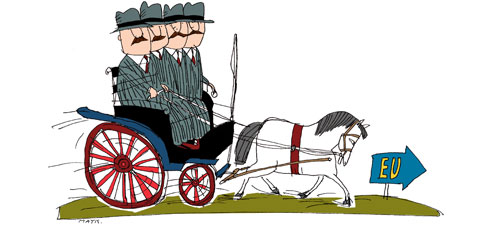The only persuasive response to the speculative pressures on the single currency is to resolutely step up the pace of European integration – replete with further pooling of sovereignty. Even the International Monetary Fund has requested national governments to speed up the transition from monetary to economic union. There’s no other way.
Crises have, in the past, moved Europe forwards. But this time around the renewed angst faces public indecision, loosening Community cohesion bonds, a rejection of “straitjacket” integration, the spread of radical populist movements exalting local particularisms, even separatism (for example, the Belgian election results), not to mention widespread – and reprehensible – indifference. And then there’s the question mark dangling over Germany: is its love affair with Europe over, or will it persist, adjusting course to steer by the north star of the German stability ethos? It seems to me that Chancellor Merkel remains committed to defending the euro based not on rhetoric about solidarity but on the advantages of fiscal rigour for the people of the Union. In fact, she deserves the credit for finally touching off a real debate about the EU’s future economic and fiscal policy.
Complacency at heart of EU troubles
Amid the tempest that has whipped up around the euro, we should also point out our mistakes – if only so as not to repeat them – and try to figure out where we went wrong. Great nations were afraid of their own shadow. Europe remained leaderless at the very moment when the launch of the single currency and the reinforcement of its institutions called for another big stride forwards; it fell to wrangling instead, beginning with the indecorous clashes over the conflict in Iraq in 2003. And one mistake brings another in its wake. To name a few more: 1) Supranational governance (or shared sovereignty) has been watered down to intergovernmental cooperation, undermining the Commission’s role as guarantor of the general interests of the Union. 2) Despite the disillusionment about Bulgarian and Romanian accession, policymakers underestimated – if not plain ignored – public opposition to eastward enlargement. 3) European credibility is undermined by the disconnect between ritually repeated objectives — Europe speaking with one voice to the world, joint representation in international financial institutions etc. — and actual results. 4) People are losing sight of the fact that national interests are best served by building up Europe and not by protecting corporate interests. 5) Erasmus-style student exchange programmes, which are vital to forging continental public opinion for future generations, have been largely neglected. 6) Europe’s vague and opaque immigration policy has helped breed a harmful confusion between multiethnic and multicultural society. 7) Finally, the most disastrous mistake: the governments have been resting on their laurels, though they knew the single currency would constitute a calculated risk, a safeguard against old demons, a stabilising tool to be buttressed by a common economic and fiscal policy.
Precious little has been done about that. Above all, the eurozone rules have not been taken seriously. There had to be a speculative attack on the single currency to drive home the inadequacy of the institutions set up to ensure the euro’s stability. Now we have to pay the bill.
Europeanism back to the drawing board
Europe’s antagonists became the self-appointed interpreters of the generic language of official Europeanism, and not those who aired inconvenient truths: e.g. [Italian ex-president] Carlo Azeglio Ciampi stressing the need for economic governance and Angela Merkel coming out against Turkish accession. Europeanism is back to the drawing board: now we need to come up with a persuasive road map to win over public opinion and the markets and patiently seek political and social harmony among the 27 states. Will the governments show the requisite courage and farsightedness?
The reinforcement of the Stability and Growth Pact will only last if shored up by a renewed commitment to completing the monetary union, making the most of the tremendous capital latent in the single market, and progressing towards political union. It may be impossible to turn a union into a supranational state, but it is possible to bring out its unified nature.
Politicians have to step back and let truly independent European authorities do their job: we’ll see what happens when the Commission gets to review national budgets even before national parliaments have a chance to thrash them out! And how will Italy face the prospect – which is still on the cards – of common economic governance, how will it maintain its necessary nexus with France and Germany? A regained respect for the Maastricht [convergence] criteria and for the necessity of European integration would confirm that we are getting back on the right track, a track successfully trodden for generations.
Was this article useful? If so we are delighted!
It is freely available because we believe that the right to free and independent information is essential for democracy. But this right is not guaranteed forever, and independence comes at a cost. We need your support in order to continue publishing independent, multilingual news for all Europeans.
Discover our subscription offers and their exclusive benefits and become a member of our community now!












